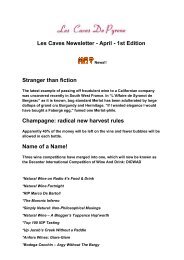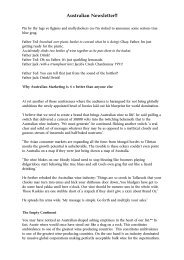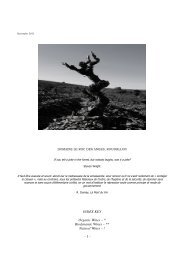Download our list here - Les Caves de Pyrene
Download our list here - Les Caves de Pyrene
Download our list here - Les Caves de Pyrene
Create successful ePaper yourself
Turn your PDF publications into a flip-book with our unique Google optimized e-Paper software.
ORGANIC WINES – THE SEMANTIC MIREIt is surprising that a positive philosophy that should connect people divi<strong>de</strong>s on so many levels. We believe – as do many of the growerson <strong>our</strong> <strong>list</strong> – in the relationship between terroir and organic viticulture, in agricultural sustainability, in sensible and sympathetic farmingpractices, in nurturing the soil and protecting the environment. Sounds fine and dandy, but t<strong>here</strong> are a group of certified growers andj<strong>our</strong>na<strong>list</strong>s who strongly believe that the use of the word “organic” (now sanctified in legislation) is <strong>here</strong>tical unless appropriatecertification is produced. Given that the growers have submitted to a regime of inspection one can un<strong>de</strong>rstand that they might feelaggrieved if people started bandying around the term willy-nilly, but I think they are being over-<strong>de</strong>fensive for a variety of reasons anddamaging the reputation of organic wines.We do not actually claim official organic status for non-certified wines, but explain in <strong>de</strong>tail in <strong>our</strong> <strong>list</strong> the viticultural practices, whichwould entitle them to that status should they wish to apply for it and be inspected. The fact that most of the estates don’t, <strong>de</strong>spite morethan fulfilling the criteria of “organic status”, is largely irrelevant. Or should be irrelevant. The growers are not trading on it, nor are we asthe wine merchant who distributes their wines, but when we know how a grower works, we tell it as it is. Despite legislation regardinglabelling no one body owns the notion of “organic” farming – if you farm organically then you farm organically. (Monty Waldin in hisbook “Biodynamic Wines” cites Felton Road Winery as a good example of an essentially organic estate that works the vines according tobiodynamic principles but is unwilling to go for organic certification because of perceived weakness of the Bio-Gro dictates). Thissemantic lockout of the word “organic” is ridiculous; if we’re forced to use a synonymous term we will, but that won’t alter the fact thatthe grapes can be grown organically anyw<strong>here</strong>. Nor, inci<strong>de</strong>ntally, are we advertising any special properties for the wines by their beingorganic although we implicitly believe that all vine growers and farmers should move towards sustainable and organic viticulture.The question that should be posed is: are organic wines better than non-organic wines? Given the extremely variable quality of food anddrink that is passed off as organic, is the term worth a candle anyway? Real quality <strong>de</strong>pends on good provenance which <strong>de</strong>pends on t<strong>here</strong>lationship between the consumer and the supplier and not between the consumer and a label, no matter how worthy the body thatconfers it. As a wine merchant we are in the position to give more information to <strong>our</strong> customers than a mere blanket certification –including <strong>our</strong> own caveats. It makes commercial sense for us to educate <strong>our</strong> customers, which entails giving them as much informationabout the product as possible. Just because an estate <strong>de</strong>scribes its produce as organic tells us nothing about the quality of farming (whenthe grapes are picked, the yields) nor does it give any indication of competence in the winery.We live in a culture in thrall to the certificate; w<strong>here</strong> information is packaged like fruit in a supermarket. We’d rather read a label thantouch or smell something. Wine labels contain much information that is crass, pointless, patronising or just plain bogus. We want tocelebrate great organic wines, not wines with labels w<strong>here</strong> “organic” is the unique selling point.In any case the certification system is flawed. We have heard from several of <strong>our</strong> growers of examples of accredited “organic” estatesspraying crops with proscribed chemicals; presumably they falsify their records. Who to believe? In other words, just because abureaucratic body ratifies something doesn’t make it true. We would presume, if this anecdotal evi<strong>de</strong>nce was correct, that these were rareexamples, but the wine world is not, and never has been, purer than pure – especially with regard to labelling. Speaking of purity – whatis the position of the farmer who does not spray at all, but whose neighb<strong>our</strong> uses pestici<strong>de</strong>s, herbici<strong>de</strong>s and other aggressive chemicalsthat militate into the soil and water table or are blown onto the organic vines of the first farmer? And are we just talking about certificates<strong>here</strong> or something more profound? As I have mentioned we <strong>de</strong>al with many growers whose philosophy is stricter than the minimalgui<strong>de</strong>lines laid down by the bodies that grant organic status. Organic farming <strong>de</strong>rives from a philosophical choice: a <strong>de</strong>sire to grow thingsnaturally without rec<strong>our</strong>se to damaging chemical solutions; to respect and protect the environment; to ensure that the soil is full of livingorganisms; in short, allowing nature to express the quality of the product. W<strong>here</strong>as many of <strong>our</strong> growers in France and Italy un<strong>de</strong>rstandand accept this as a matter of c<strong>our</strong>se, they do not see the necessity for some officious body to pronounce on a farming methodology letalone a lifestyle that they have been privately pursuing for years and possibly for generations. Others have ma<strong>de</strong> a consi<strong>de</strong>red choice toeschew certification. Why? Because they strongly believe that the current EEC laws are weak and poorly administered and that the needto fill out more paperwork has little or nothing to do with the choices that they make as artisanal growers. As Jean-Gérard Guillotobserves in Patrick Matthew’s The Wild Bunch, “C’est une question <strong>de</strong> liberté. I have the necessary paperwork to go organic. But insome cases it’s a racket, anyway. Let’s face it, either people like the wine or they don’t. The whole philosophy is in the wine, not on thelabel”.Calling a wine organic has not sold a single bottle for us. The quality of what is in the bottle always matters most. Should a customer askus about organic wines then we are totally transparent, highlighting those that are genuinely certified, but also mentioning growers an<strong>de</strong>states that abi<strong>de</strong> by the selfsame principles laid down by Ecocert and other similar bodies. We don’t confer any legitimacy on thosewines other than <strong>our</strong> profound knowledge of the growers and the way they work in their vineyards. Knowledge may not constitute proofin a verifiable legal sense, but knowledge, in an evaluative sense, is more meaningful than a certificate qua certificate.In summary, we support growers who make quality wine. We have seen an enormous growth towards the eradication of chemicals in thevineyard and a movement towards sustainable agriculture with respect for biodiversity. This is not so they (the growers) can achieve acertificate, but that they can have a vital, healthy vineyard with healthy grapes, the raw material to make great wines.- 48 -








